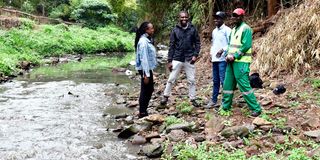Generation Green: Young people on the frontline of climate crisis

Lakisama Environmental and Waste Management Organisation Director\Founder Alvin Ochieng (second left) engages with some of his organization members next to Nairobi River as it flows down the Globe Cinema Roundabout on October 5, 2023. Picture by Francis Nderitu
What you need to know:
- he World Health Organization has predicted that more than 80 per cent of climate-related health issues will affect young people. This is due to their immature physiological defences, proximity to the environment, dependence on adults and accumulation of risks throughout their lives.
- LEMWO members collect and repurpose waste using a circular economy model. They have set up a Sacco to deposit savings and designated spots for waste drop-offs. The remaining waste is disposed of at the Dandora dumpsite.
Kenya has a significant number of young people, with those under 15 making up 39 per cent of the total population, according to the State of Kenya Population 2020 report. This demographic is especially vulnerable to the effects of climate change as they will soon become the adult population.
The World Health Organization has predicted that more than 80 per cent of climate-related health issues will affect young people. This is due to their immature physiological defences, proximity to the environment, dependence on adults and accumulation of risks throughout their lives. The trouble is compounded by their extended exposure to impacts and limited political influence.
Young people must take action to combat climate change and build a sustainable future, experts say. As UN Secretary-General António Guterres stated on International Youth Day earlier this month, young people must be equipped with skills and knowledge to shape a cleaner, greener, more climate-resilient future.
As climate activists raise awareness and promote green technologies, some youth groups and individuals are implementing strategies to reduce emissions and promote community resilience.
For instance, Lucky Summer Ward in Ruaraka Sub-County has transformed positively. Previously, the area, which neighbours Baba Ndogo location, was plagued by illegal dumpsites that emitted foul odour.
But the dumpsites have been replaced by green spaces where children can play. This achievement results from the efforts of Luckysummer Environmental and Waste Management Organisation (LEWMO), which comprises 11 youth groups formed in 2017. LEWMO is responsible for managing and disposing of solid waste sustainably. The group has organised workshops for its members to teach them how to reuse waste collected from the estates, thereby reducing waste in landfills.
LEMWO members collect and repurpose waste using a circular economy model. They have set up a Sacco to deposit savings and designated spots for waste drop-offs. The remaining waste is disposed of at the Dandora dumpsite.
“We have many uses for waste collected from households. We repurpose organic waste for manure at the reclaimed green spaces and to make livestock feed,” explains Alvin Ochieng, LEMWO founder.
The group is dedicated to sustainable practices such as restoring riparian land and raising awareness through youth workshops.
Elsewhere, the Green Army initiative is planting trees in 47 counties. Launched by President William Ruto in December last year, the initiative has partnered with local youth groups and schools to ensure proper tree monitoring and care.
In a different part of the city, the Polly Foundation supports ecosystem restoration and mental health awareness while inspiring young people to influence policy and build resilience through tree planting, conservation, intercommunal training and interactive discussions.
“The vision is for a Kenya that prioritises renewable energy, regenerative agriculture and sustainable urban planning—a nation where ambition meets policies that go beyond mere promises,” says Pauline Owiti, sustainability champion and resource mobiliser at Polly Foundation.
While acknowledging Kenya's progress, she emphasises the need for a collaborative approach where government policies resonate with the dynamic initiatives of the youth.
Climate Change Envoy in Kenya Ali Mohamed notes that the Kenyan youth have shown great appreciation for innovations in climate action. He points out that youth across the country show impressive progress in all sectors, including agriculture, transport, the housing sector and waste management.
“We should celebrate that our youth are very innovative. They generate income and employment from their climate-solution-led actions. Some have developed apps that are now being used in different places to tell what tree species do well in those regions, which is very creative,” he notes.
He mentions youths who have earned global recognition for unique, sustainable innovations and initiatives.
“Our engineers, electricians and chemists are making huge strides in innovation. Today, some young Kenyans fabricate the machinery required for Direct Air Capture (DAC). DAC has been proven to remove carbon dioxide directly from the air.”
While Kenya lacks ways to measure the effectiveness of all the solutions youth across the country are creating, Mohamed feels there has been undeniable progress.
“There’s no coordinated approach at the moment, but there is undoubtedly youth action. I now challenge the youth to develop software that can track and help spread innovations. If a young person in Homa Bay is doing something innovative, their Moyale counterpart should hear about it, adapt it, and scale it up,” he concludes.




